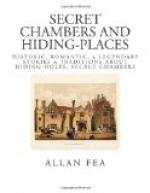[Illustration: HINDLIP HALL, WORCESTERSHIRE]
Three days had been wholly spent, and no man found there all this while; but upon the fourth day, in the morning, from behind the wainscot in the galleries, came forth two men of their own voluntary accord, as being no longer able there to conceal themselves; for they confessed that they had but one apple between them, which was all the sustenance they had received during the time they were thus hidden. One of them was named Owen, who afterwards murdered himself in the Tower; and the other Chambers; but they would take no other knowledge of any other men’s being in the house. On the eighth day the before-mentioned place in the chimney was found, according as they had all been at several times, one after another, though before set down together, for expressing the just number of them.
“Forth of this secret and most cunning conveyance came Henry Garnet, the Jesuit, sought for, and another with him, named Hall; marmalade and other sweetmeats were found there lying by them; but their better maintenance had been by a quill or reed, through a little hole in the chimney that backed another chimney into the gentlewoman’s chamber; and by that passage candles, broths, and warm drinks had been conveyed in unto them.
“Now in regard the place was in so close... and did much annoy them that made entrance in upon them, to whom they confessed that they had not been able to hold out one whole day longer, but either they must have squeeled, or perished in the place. The whole service endured the space of eleven nights and twelve days, and no more persons being there found, in company with Mayster Abbingdon himself, Garnet, Hill [Hall], Owen, and Chambers, were brought up to London to understand further of his highness’s pleasure.”
That the Government had good grounds for suspecting Hindlip and its numerous hiding-places may be gathered from the official instructions the Worcestershire Justice of the Peace and his search-party had to follow. The wainscoting in the east part of the parlour and in the dining-room, being suspected of screening “a vault” or passage, was to be removed, the walls and floors were to be pierced in all directions, comparative measurements were to be taken between the upper and the lower rooms, and in particular the chimneys, and the roof had to be minutely examined and measurements taken, which might bring to light some unaccounted-for space that had been turned to good account by the unfortunate inventor, who was eventually starved out of one of his clever contrivances.
Only shortly before Owen had had a very narrow escape at Stoke Poges while engaged in constructing “priests’ holes” at the Manor House. The secluded position of this building adapted it for the purpose for which a Roman Catholic zealot had taken it. But this was not the only advantage. The walls were of vast thickness and offered every facility for turning them to account. While “Little John” was busily engaged burrowing into the masonry the dreaded “pursuivants” arrived; but somehow or other he slipped between their fingers and got away under cover of the surrounding woods.




